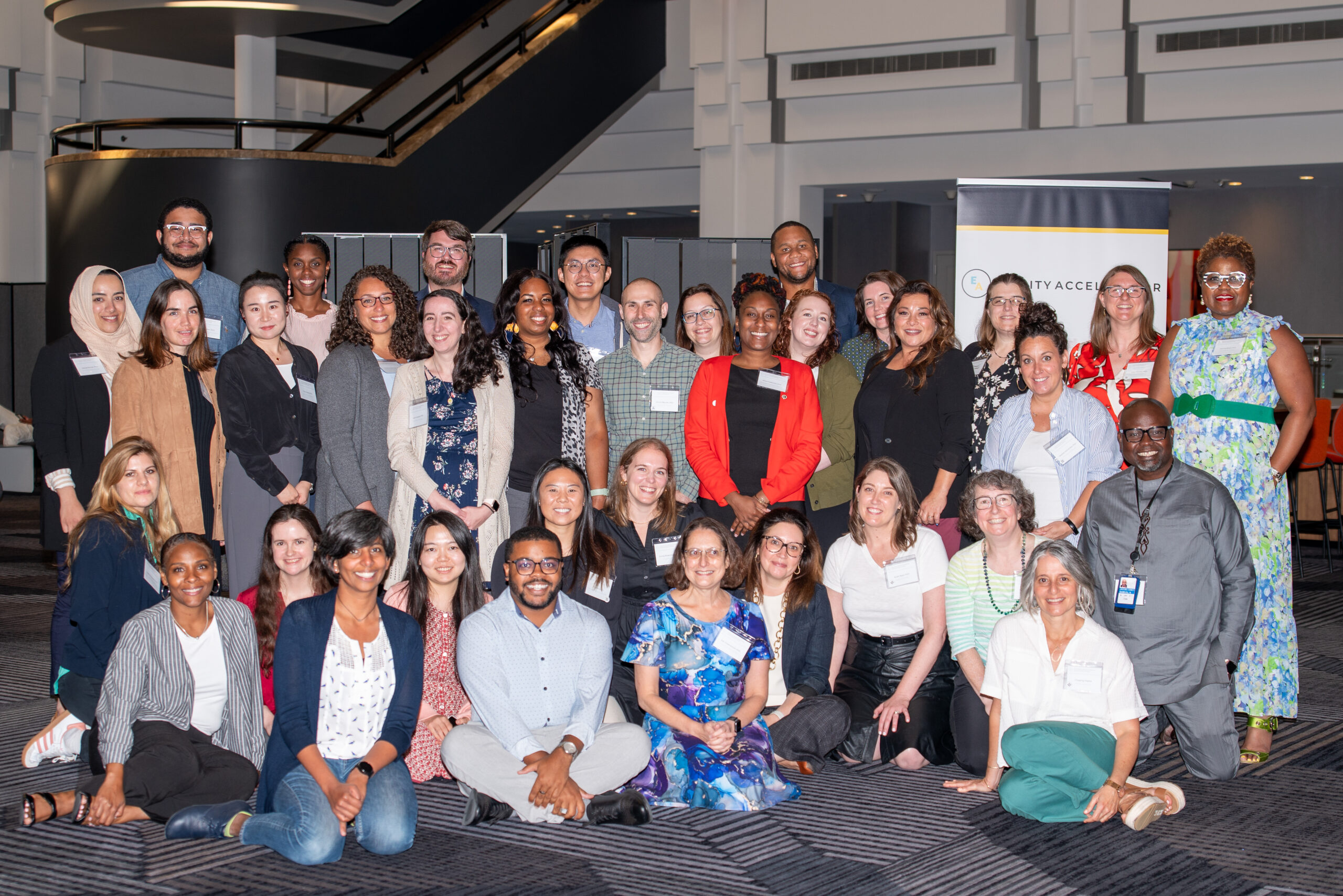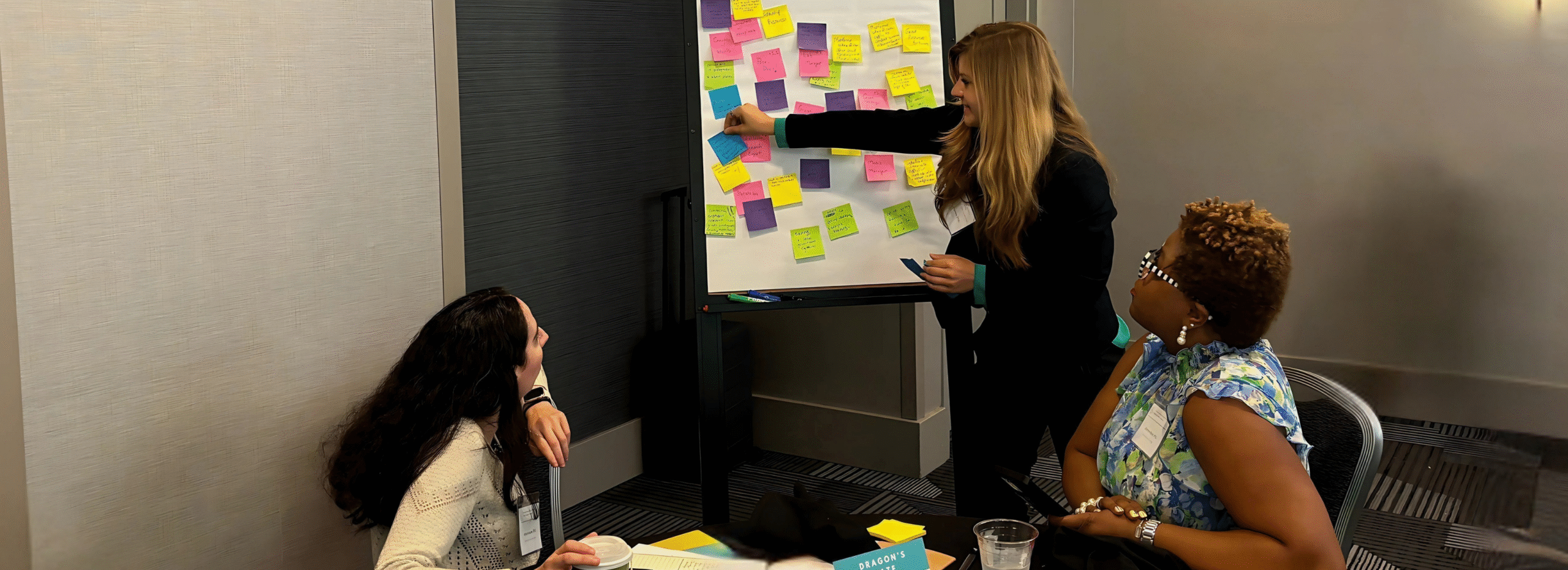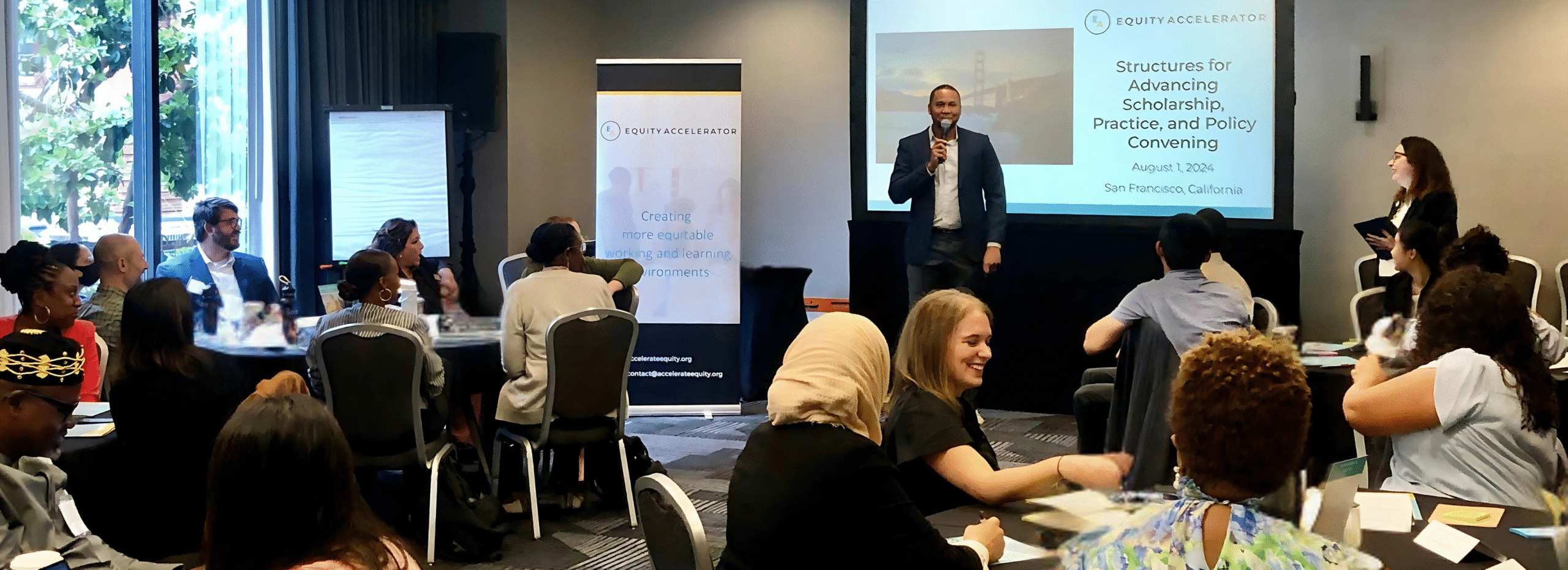New evidence-based course for instructors—available now!
ENGAGEMENT HIGHLIGHTS
THE OPPORTUNITY
The Equity Accelerator’s (EA) mission is to create learning and working environments where all people have the support, opportunities, and resources they need to thrive. Effectively catalyzing equitable systems change requires collaborative engagement across fields—engaging the ideas, insights, and expertise of diverse and interdisciplinary actors who share common goals. This type of collaboration advances our understanding of the structures, policies, and practices that perpetuate long-standing inequities and generates actionable insights for dismantling systemic barriers to close gaps in experiences, opportunities, and outcomes in higher education.
OVERVIEW OF PARTNERSHIPS AND ACTIVITIES
EA hosted the Structures for Advancing Equity Scholarship, Practice, and Policy Convening in August 2024. The convening, which was made possible by generous support from the Student Experience Research Network and College Futures Foundation, brought together 32 early and mid-career scholars and practitioners from 28 universities and organizations across the country whose research contributes to improving the experiences, opportunities, and outcomes for student groups who historically and currently face disproportionate structural barriers in higher education. Participants in the convening represented a variety of disciplines*, institution types**, practice areas, and geographic locations, providing a diverse range of perspectives on the needs and challenges across fields.
The overarching goal of the Structures for Advancing Equity Scholarship, Practice, and Policy Convening was to learn from and support educators and researchers in higher education that center issues of representation—ensuring that college is a welcoming environment where everyone can participate and learn in their scholarship and teaching. This convening brought together these early and mid-career scholars and practitioners to identify and discuss what supports, resources, and connections they need to continue to effectively design, implement, and scale student-centered, equitable, and evidence-based policies, practices, norms, and structures at all levels of their own institutions, as well as institutions that they partner with in their work.
The convening provided infrastructure and protected time for participants to connect with other equity-focused scholars and practitioners from different institutions, disciplines, methodologies, and sub-fields. Participants were able to learn about each other's work, explore opportunities for collaboration and support, and identify areas of need and common challenges across disciplinary, institutional, and methodological silos. Through an interactive needs assessment, participants engaged in group ideation to begin developing a collaborative vision for creating the infrastructure and network connections necessary to bridge research, practice, and policy for transformative systems change at scale.

KEY OBJECTIVES & GOALS
FIELD INSIGHTS
3 KEY AREAS OF NEED
The needs assessment conducted at the convening highlighted three broad areas of need for advancing basic and applied research for equitable systems change at scale.
1. Support Coordination Among Scholars and Practitioners
Convening participants identified support for coordination among scholars, and between scholars and practitioners as one of the most critical and urgent needs for advancing their work. Notably, this need aligns with field-building frameworks, such as the Strong Field Framework, which identifies a credible and evolving knowledge base that can effectively draw connections between challenge areas across fields of inquiry as a cornerstone of effective field-building.
Needs identified by convening participants in this area include: protected time and space to engage in thought partnership and networking to build community and share knowledge across fields; opportunities to receive mentorship and professional development training (particularly for early and mid-career scholars and practitioners); facilitation of new network connections across disciplines to support interdisciplinary collaboration and innovation; and guidance on effective approaches for translating field knowledge for policy audiences.
Several key supports may drive this type of coordination, including convenings that combine the expertise of scholars, practitioners, and educators, early and mid-career fellowship programs, near-peer faculty mentorship programs, and virtual networks where scholars and practitioners can bridge geographic and disciplinary gaps to advance a field-level vision for advancing equity in higher education at scale. Moreover, convening participants highlighted that participating in fellowship programs, receiving mentorship, and providing mentorship were particularly valuable, because they provided consistent opportunities to continue to develop their skills as scholars and practitioners and refine their equity-focused classroom and research practices. These approaches equip scholars and practitioners with tools, resources, and support to facilitate bottom-up transformation at higher education institutions—in the classroom and at all levels of the system.
Programs and policies that support community and network connections among scholars and practitioners are critical for developing and advancing field-level agendas focused on dismantling barriers and advancing innovative and adaptive student-centered solutions. Convening participants also noted that they are critical for building resilience and energy among actors, particularly for those who pursue equity work in environments with relatively low institutional support. This impact was highlighted by the participants in their convening reflections and feedback:
The biggest takeaway for me was the power of intentional community building [and] how important it is for progress. Also the benefit of interdisciplinary, diverse communities…We truly need more of these [convenings]!
2. Flexible Funding for a Wide Range of Activity
One of the greatest barriers to advancing efforts for educational equity at scale identified by convening participants is securing sustainable and flexible financial capital to support the staff needs and direct costs required for research, community collaborations, and evidence-based programming. As support for scholars and practitioners who wish to test and apply evidence-based equity policies and practices at scale are increasingly challenged, the need for funding to support innovative approaches to creating more learning environments where all students can thrive has only become more crucial. To effectively and continuously build the knowledge base for this work, funding is needed for all levels of research and practice—ranging from shorter-term exploratory and evaluative studies to longer-term large-scale initiatives.
Scholars and organizations leading equity-focused initiatives need flexible funding, as well as robust support from philanthropy and foundations, to ensure their work can move forward. In particular, scholars noted that to most effectively diversify the body of knowledge produced by the field, greater support from funders is needed to ensure funding opportunities for scholars and practitioners from all backgrounds and institution types. This insight from our needs assessment aligns with federal research tracking the persistent funding gaps that exist between underrepresented and non-underrepresented scholars and practitioners, which is partially linked to the fact that underrepresented scholars and practitioners are more likely to propose previously unstudied and innovative topics that largely go unrecognized in their fields, compared to their non-underrepresented counterparts. Research also finds that students benefit academically and psychologically from interacting with underrepresented faculty members who are more likely to employ effective teaching methods, such as student-centered learning. To continue evolving our tools and approaches for advancing equity in higher education, capital support for emerging and innovative areas of inquiry is key.
Moreover, even for scholars and practitioners who secure funding, shifts in how funds are allocated and distributed could help address barriers that hinder the effective use of awarded funds. For example, some scholars acknowledged a logistical and administrative roadblock that makes external funding inaccessible: their colleges lack institutional structures for processing and administering large grants. For these scholars, efforts to simplify and streamline grants administration requirements and flexible allowances for use of funds allow research teams to move more nimbly, maximizing the impact that investments can have on collaborations and new knowledge production. Other scholars and practitioners work in states where legislative changes have undermined their ability to engage in equity-focused work. In cases such as these, greater access to external support, such as those provided by incubator organizations, may help bridge these gaps and ensure the grant funds are able to be used effectively and efficiently when they are awarded.

3. Investment in Collaborative Infrastructure
The last overarching theme that emerged from the convening was the need for greater field-level infrastructure that can serve as the “connective tissue” across scholars and practitioners. Specific areas of need include structures and supports for sharing knowledge, resources, and frameworks for effective implementation, scaling, and evaluation of successful evidence-based practices; the development of cross-field and cross-institution research networks to support collaboration; open access or sharable tools for longitudinal and real-time data collection that is able to track and adjust to social shifts; avenues through which scholars can match with practitioners and leaders for applied research and practice opportunities; and shared communication channels where actors can share relevant funding opportunities or sources, examples of successfully funded proposals, and writing strategies.
Such infrastructure has the potential to be realized in many different forms, including through the development of community forums or network directories where scholars and practitioners can stay connected and share both resources and requests for support. The institutionalization of community networks could provide an adaptable space for academics, researchers, and practitioners to mutually share advice, knowledge, and resources across the entire network. The network members could plan, organize, and execute events such as workshops, conferences, and panels. Examples of resources include templatized guides and best practice resources for developing, executing, and evaluating research at scale or for identifying and applying for relevant funding opportunities.

Finally, to effectively support coordination among scholars and practitioners (Field Insight #1) and provide access to and awareness of flexible funding for a wide range of activity (Field Insight #2), collaborative infrastructure or “connective tissue” needs to be established, institutionalized, and disseminated (Field Insight #3). Consistent with the Strong Field Framework, this collaborative infrastructure (e.g., an interactive online platform) would allow for the continued recruitment of scholars or practitioners into the community while developing and maintaining geographically distant relationships by cultivating a welcoming environment that scholars can connect to 24/7, year-round.
CONCLUSIONS
The Structures for Advancing Equity Scholarship, Practice, and Policy Convening assessed the needs, challenges, and goals revealed by scholars and practitioners to develop a solutions-based plan to support equity-focused faculty, with the goal of generating insights for advancing equitable systems change at scale. The convening participants expressed an overwhelming desire for access to a welcoming and disciplinary-diverse community for support, guidance, and connection.
It is so important to reach out [and] talk to [people, because] there are others doing similar work [and] others experiencing similar things to me…connecting both makes me feel less alone [and] helped me identify who to reach out to for collaborations.
Recommendations for how organizations and foundations can offer support
Effectively supporting early and mid-career faculty is critical to driving innovation and transforming institutions of higher education into environments that promote evidence-based, equity-focused research, scholarship, and learning. Indeed, the effects of this work are profound. By creating learning environments where all students can thrive, faculty play a key role in helping students develop the skills and knowledge that will help them reach their full potential in college, and beyond.
*Including business, cognitive science, education, management, public health, population health, psychology, social psychology, sociology, social work, teaching, and learning.
**Participants included individuals from: 21 public colleges and universities; 6 private universities; 2 equity-focused university affiliated organizations; 8 land-grant universities; 4 historically Black colleges and universities (HBCUs); 2 Hispanic-serving institutions (HSIs).
Equity Accelerator (2025). Case Study: Catalyzing equitable systems change for higher education: Building networked communities to advance scholarship, policy, and practice.
How can we help your organization's growth journey?
We offer high-impact approaches that are practical, adaptable, and integrate into what you’re already doing.